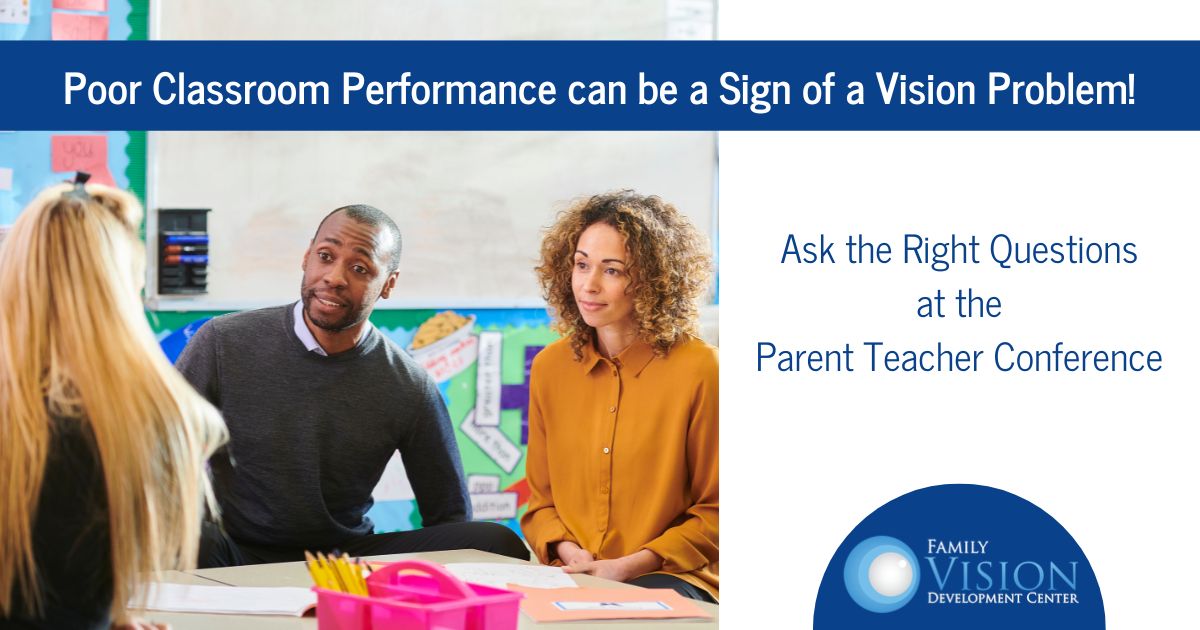November is typically the time of year that schools allow parents the opportunity to meet individually with their child’s teacher in order to assess their progress and discuss any issues before getting too far into the school year. As the teacher explains your child’s behaviors in the classroom, interactions with other students, punctuality with homework assignments and more, make sure to listen closely. If you hear the teacher mention any of the following issues, it could be a sign of an underlying vision condition.
Classroom Clues that can Indicate a Vision Issue
- Reading problems – a vision disorder can cause a child to transpose letters, confuse similar letters or words, skip lines or words while reading, or lose their place easily. Additionally, vision conditions often cause blurry or double vision. Any of these issues could obviously make reading extremely challenging.
- Avoids doing homework – if a student has a vision condition, it can be very difficult to complete visually demanding tasks. Therefore, they may lose interest or give up trying to complete assignments.
- Messy handwriting – Children with vision problems may have poor eye movement skills or poor visualization abilities. The lack of these necessary skills could prevent a child from being successful at writing.
- Sits too close to the board, computer screen or reading materials – when a student consistently positions himself or herself very close to things they need to read, it might mean they cannot see clearly from a distance. This can affect classroom performance when important information is outside of their clear field of vision.
- Poor behavior in the classroom – when a student cannot maintain focus, they may begin to act out. But many students are misdiagnosed with ADHD, when binocular vision disorders actually have similar symptoms. In fact, functional vision problems often mimic ADHD symptoms, such as difficulty focusing, fidgeting in their seat or making careless mistakes. Any child facing an ADHD diagnosis should also be examined for a binocular vision problem.
Additional Questions to ask the Teacher
Along with discussing classroom performance, it’s a good idea to also question any unusual frequent behaviors by your child. The teacher interacts with your child on a daily basis so ask if they notice any of the following occurring consistently throughout the day. While these issues may not directly affect their academic performance, they can be signs of a possible vision issue:
- Excessive rubbing of their eyes
- Abnormal head tilting or turning
- Often complains of headaches
- Sensitivity to light
- Poor hand-eye coordination
- Frequently bumps into things
Explore the Possibility of a Binocular Vision Disorder
A teacher may be quick to assume that a child has a problem with learning new material, has a behavior issue, is not interested in participating or does not have the capability to succeed in school. However, this could be because they have not been trained to watch for signs of an underlying binocular vision condition. Correcting a binocular vision disorder can be just what your child needs to experience school in a whole new way and enjoy the success they truly want!
When you bring your child in to Family Vision Development Center for a comprehensive vision exam, we will thoroughly evaluate and diagnose any vision issues that could be affecting your child’s school performance. Additionally, we offer many ways to effectively treat the common binocular vision disorders that can cause classroom struggles. In fact, our doctors have extensive training in the latest vision therapy techniques that can vastly improve your child’s visual skills. Contact us at 630-862-2020 to schedule your appointment and set your child on a path to success.
Family Vision Development Center is a full-service vision center offering innovative vision therapy services, sports vision therapy services, post-concussive vision rehabilitation, comprehensive vision exams for eyeglasses and contact lenses, management of ocular diseases including glaucoma, diabetes, macular degeneration and cataracts, and a state-of-the-art optical center offering the latest designs in eyewear.

